Steph W. from SEOPressor


...help you check your website and tell you exactly how to rank higher?


83
score %
SEO Score

Found us from search engine?
We rank high, you can too.
SEOPressor helps you to optimize your on-page SEO for higher & improved search ranking.
By vivian on June 13, 2019
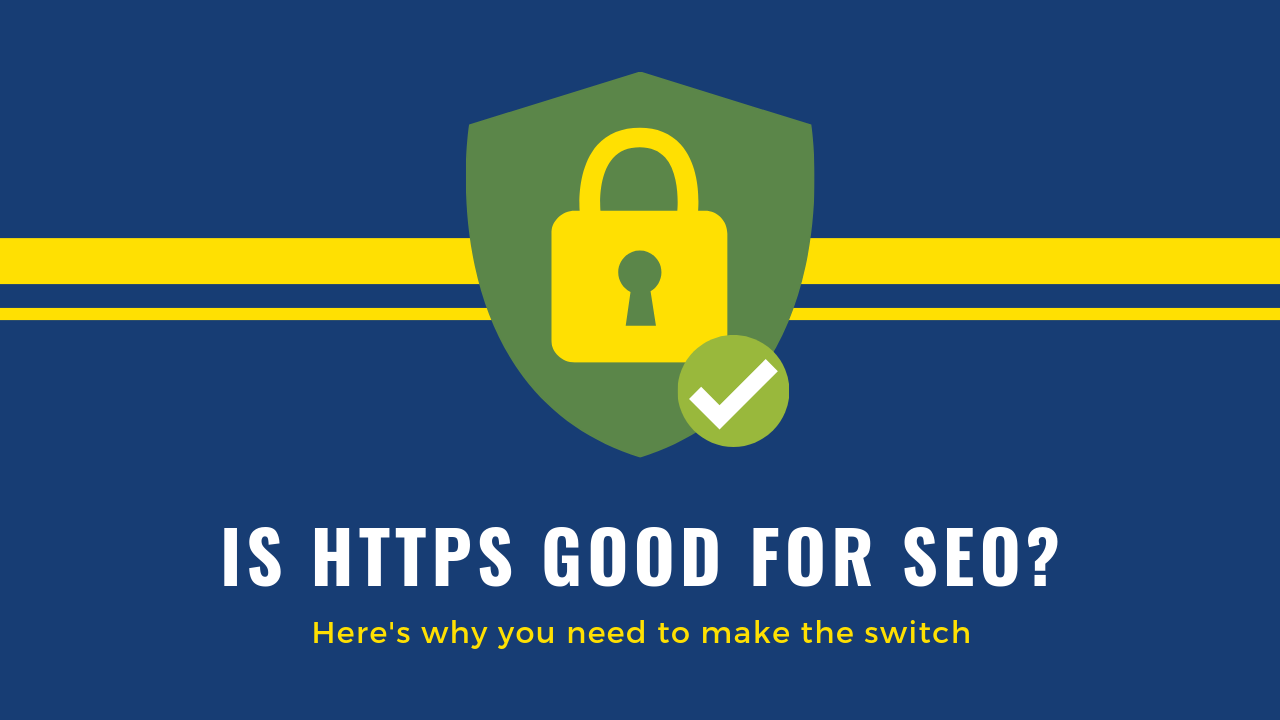
Are you still unsure if you should change your website to HTTPs?
You might have heard about some bad experience when making the change from HTTP to HTTPs, talking about their drop in rankings or losing link juice.
Yes, the outcome can be risky if it is done incorrectly. But the truth is, having your website remain on HTTP can actually be more hurtful in the long run. Here’s why.
In terms of security, HTTP is completely fine when you are just browsing through the website. It only becomes an issue if you are entering any private or confidential data like passwords and credit card details.
Traditionally, this makes HTTPs something only needed by ecommerce sites for their payment pages, that is until 2014 when Google announced HTTPs as a ranking signal.
Then again, HTTPs was just a minor signal in Google’s ranking algorithm. Only a few websites saw slight improvements in their ranking results after the update.
Besides, there’s no actual penalization for HTTP websites. Even if you ignored it, you can still end up on the first page of SERP.
So why bother to make the switch now?
Well, this takes us back a few years ago when Peter Meyers from Moz published his study on HTTPs, where he found that 30% of Google first page results were websites with HTTPs.
Peter repeated the same study again in April 2017 and found that the number of HTTPs websites appearing on the first page of SERP has peaked to 50%.
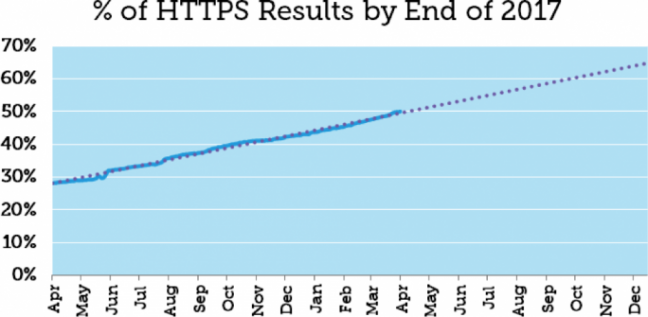
HTTPs results on page one search results reached at 50% by April 2017
The graph shows a steady increase and that a lot of websites which had made the move to HTTPs is overtaking their HTTP counterparts.
Back to the stats again a year later. RankRanger posted on Twitter in February 2018 showing that now over 70% of the page one Google search results listings are HTTPs.
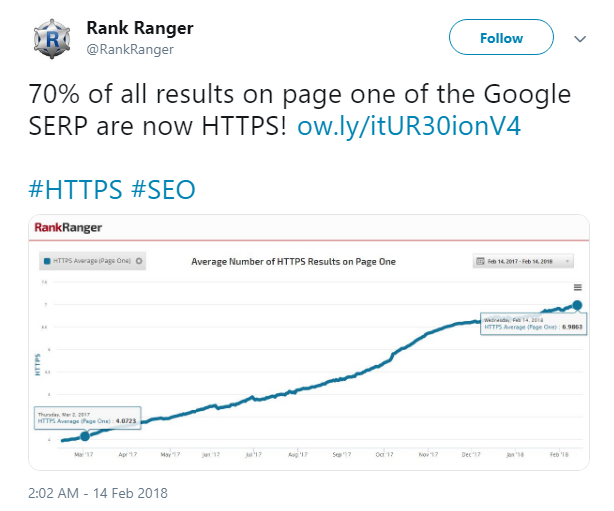
Moreover, this is not the only result.
If you’ve ever done any kind of research on HTTP vs HTTPs, you will have came across multiple studies showing how important is HTTPs and its correlation with higher search rankings.
Moving forward, Google has also hinted at a fully secure web in the future, stating that they will continue working towards a web that is secure by default.
In fact, the whole internet is shifting towards HTTPs.
Following an Alexa rank list published in July 2018 which notes 100 of the world’s most popular websites that are still using HTTP, 32 websites including Sina, Rakuten, and ESPN have already converted to HTTPs.
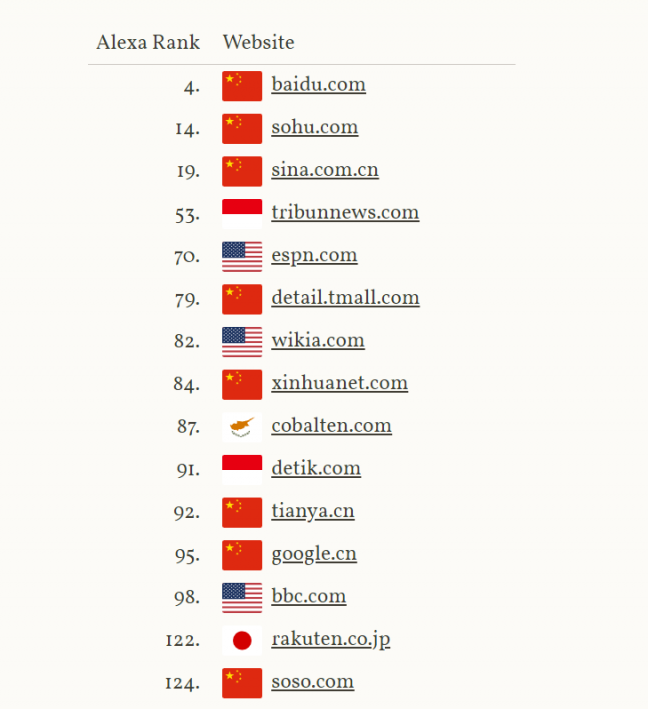
You can see the full HTTP Shame list at whynohttps.com
Most of the websites that have yet to make the change were websites from China.
Every website starts with the basic communication protocol HTTP, a hypertext transfer protocol that defines how messages are transmitted between the visitor’s browser and website server.
When you install and add an SSL certificate on your server, it is like setting up an extra layer to protect and encrypt that information transmitted between the browser and server.

Think of the S as extra Security
With HTTPs, your URL becomes more secure than the conventional HTTP, as the SSL 2048-bit key protects the website connection through authentication and encryption.
Secure websites can protect a user’s connection by securing information in three layers:
Simply put, HTTPs makes it harder for hackers to break the connection and steal any personal information such as credit card numbers, passwords, addresses, etc.
Your website becomes more secured and visitors can rest assured that their activity on the website cannot be tracked by any outside parties.
Then again, how does HTTPs affect SEO?
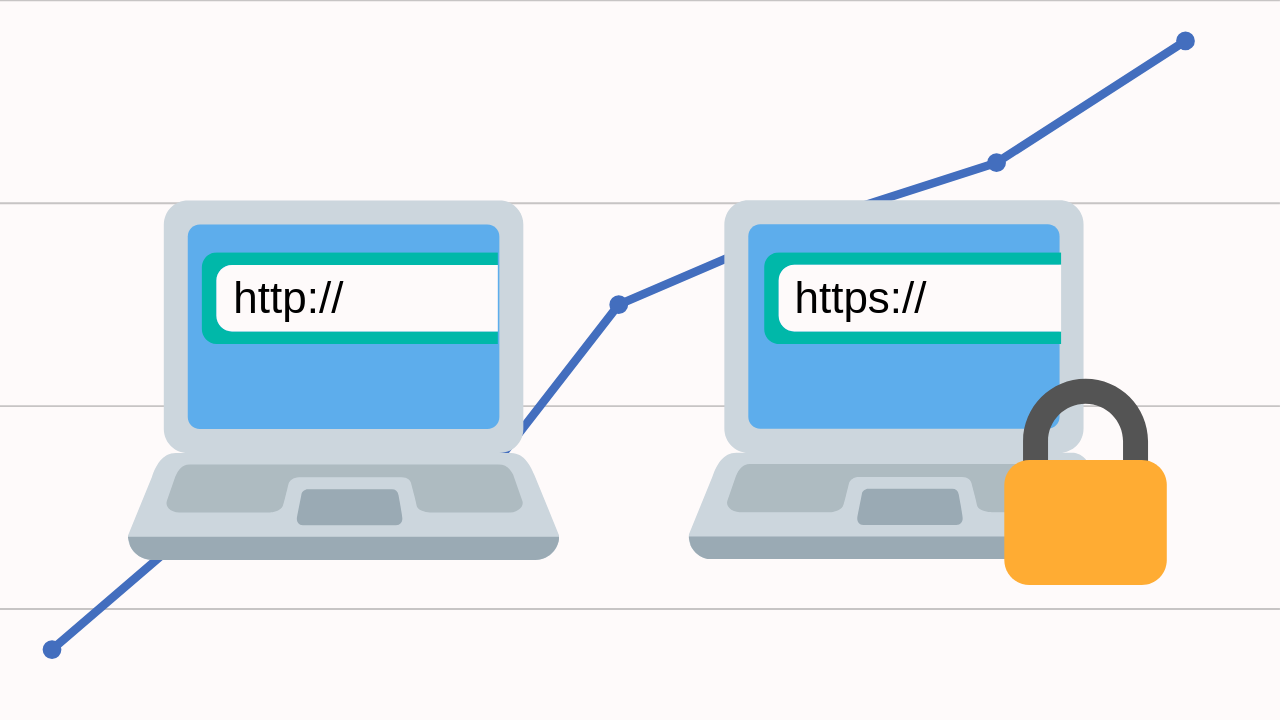
You might still be unclear about how adding an SSL Certificate helps in improving search engine ranking. Well, the answer is security.
Recall that back in 2014, Google rolled out an algorithm update that included website security as one of its ranking signals. The algorithm favor sites that had SSL certificates, which in other words are HTTPs websites.
In 2015, Google increased the weight of this ranking factor, emphasizing that HTTPs could be an important tie-breaker between you and your competition.
Meaning if you and your competitor’s website are equivalent in terms of speed, content freshness, and backlinks, but your competitor’s website has HTTPs and you don’t, Google will most likely rank your competitor first.
What does it look like today? It is still a very small ranking factor.
Though at this current moment, the SEO impact of migrating from HTTP to HTTPs isn’t overwhelmingly negative, things are moving in that direction.
Google’s taking security very seriously and has sent out warnings to websites which have yet to migrate to HTTPs.
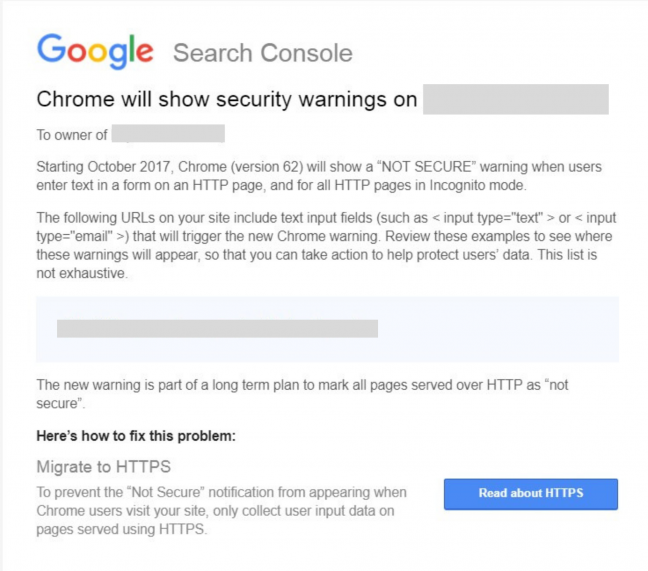
Here’s an email that Google sent out to Search Console users, and the message is: Adopt HTTPs by October 2017 or suffer the consequences.
But it’s not just about your rankings, moving from HTTP to HTTPs affects your website’s user experience.
Since the large-scale cyber attacks that led to huge amounts of data being stolen, internet users have been wary of the kinds of websites they are on.
They become more than educated about HTTPS, and in fact are looking for the HTTPs on your website, especially if it involves any monetary transactions.
A GlobalSign survey shows that 84% of users would abandon a purchase if data was sent over an insecure connection, indicating that website insecurity can impact sales.
Nowadays, security is no longer a nice addition. It’s a necessity and websites must promote SSL and security indicators to gain customer trust, because at times your business just depends on it!
In July 2018, with the release of Chrome 68, Google has started labeling all HTTP sites as not secure.
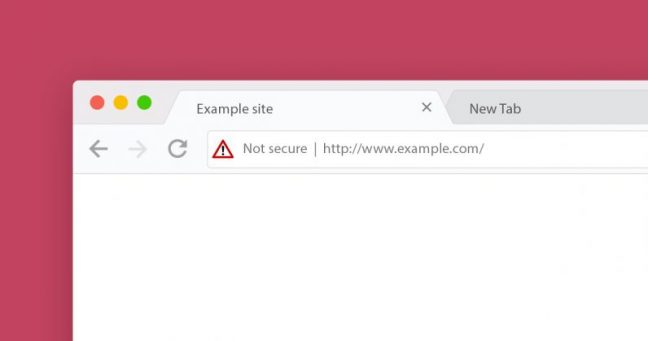
Imagine what your users will think when they see such a warning sign, especially if they are at an ecommerce site.
Chances are, they are not staying. Would you?
Another thing is HTTPs websites actually load much faster than HTTP sites.
If you surf a webpage on HTTPs and the web server supports HTTP2, you will get all the cool benefits of new protocol HTTP2, which most importantly includes wonderful performance benefits.
Because get this: HTTP2 is able to maximize your device bandwidth by running more requests in parallel and over the same TCP connection.
By just using HTTPs, websites are able to get a decent 15% speed boost! And as we know, sites with faster speeds are more likely to rank better.

HTTP vs HTTPs
Naturally, better rankings can also lead to more traffic.
Because really, when searching the Internet, you would most likely pick out a secure site over a non-secure site in the results.
This would, of course, go to improving your site’s click-through rate.
So are you ready to make the change?
Installing an SSL certificate can be a drag if you are not technical. If you would like some help, you can always ask your hosting company or hire an experienced developer.
However if you are familiar with the backend of a website, then switching to HTTPs is fairly straightforward, you just need to follow these steps:
Voila! You’re done! Look at the address bar in your browser and you will find the lock icon.
Once you are done, also remember to change the protocol of your website from HTTP to HTTPs in Google Analytics and Google Search Console.

Today, having HTTPs or not is no longer optional because having HTTPs on your website greatly affects both website security and SEO.
Because just imagine if a customer came into your store and voiced concern about something, you would do everything you can to alleviate that concern and create not only a loyal customer.
It should be the same online – make your customers and prospects feel safe and give them peace of mind when they are on your website.
Besides, the cost of HTTPS is also minimal for each web connection, and the benefits far outweigh the cost! Having HTTPs is not just one of SEO 2019 trends, its the future.
So if you are still operating your website on HTTP, it’s time to make the switch while HTTP to HTTPs SEO impact isn’t overwhelmingly negative.
In the end, is HTTPs good for SEO? Well, it’s not just SEO – having HTTPs is definitely the safer option than HTTP.
Updated: 28 February 2026


Save thousands of dollars (it’s 100x cheaper)

Zero risk of Google penalty (it’s Google-approved)

Boost your rankings (proven by case studies)
Rank High With This Link Strategy
Precise, Simplified, Fast Internal Linking.
